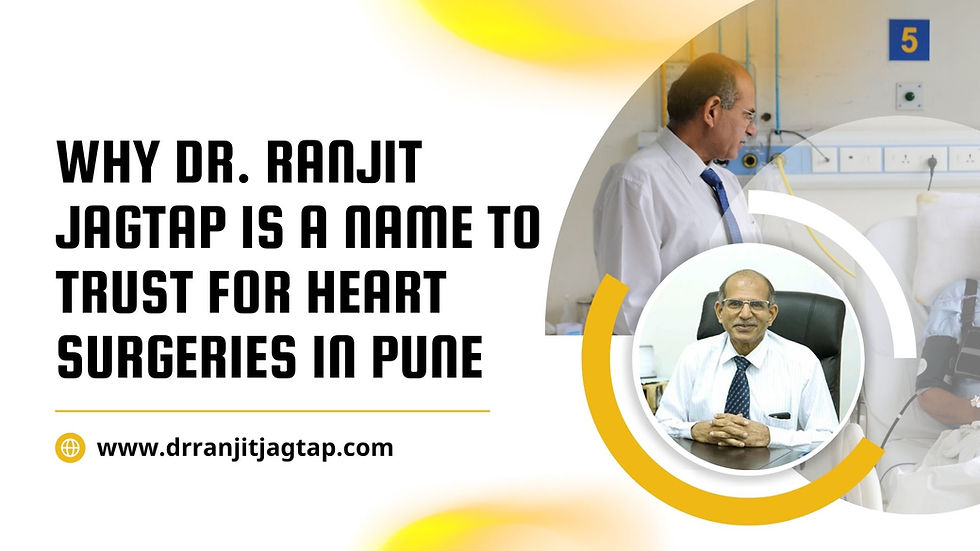Know The Difference: Heart Attack vs. Cardiac Arrest- Dr. Ranjit Jagtap
- drranjitjagdap
- Jan 17, 2024
- 3 min read

When someone's sick, it can get confusing to understand the difference between a heart attack and sudden cardiac arrest. They may sound alike, but they're different problems needing different fixes, but quick help is super important for both. This article from Dr. Ranjit Jagtap News helps clear things up by talking about what each is, why acting fast is necessary, and sharing information on symptoms, things that make you more at risk, and how to stay safe. Let's go through it all step by step.
The Nature of Cardiac Arrest and Heart Attack
When we talk about cardiac arrest and heart attack, we're looking at two different things our heart can go through. Cardiac arrest is like a glitch in the heart's rhythm caused by an electrical problem. On the flip side, a heart attack happens when the heart doesn't get enough blood, often because something is blocking it. Both are serious, but we have to deal with them in different ways. Let's take a closer look to understand what exactly happens inside our bodies when these challenging moments hit as per Dr. Ranjit Jagtap.
What Is Heart Attack?
A heart attack, or myocardial infarction (MI), is like a traffic jam in the tiny roads of the heart called coronary arteries. These roads carry life-saving oxygen-rich blood to the heart. If a blood clot forms, it blocks this flow, causing a heart attack. Quick help is needed to avoid harm. Choices like smoking, bad diet, and health issues like diabetes or high blood pressure can raise the risk. So, knowing how these blockages happen and what makes it more likely is important to keep our hearts safe.
Symptoms of a Heart Attack
Recognising a heart attack is about knowing the signs. These signs can be different but often involve chest pain or pressure, feeling like something heavy is on your chest. Shortness of breath, nausea, vomiting, and heavy sweating are also common. Some heart attacks happen suddenly, strongly and right away, while others take time, spreading over hours, days, or even weeks. It's not the same for everyone. People with diabetes or women might have different signs, like jaw or back pain, tiredness, or dizziness. Knowing these signs helps act quickly, an important step in dealing with a heart attack.
What is a Cardiac Arrest?
As Stated by Dr. Ranjit Jagtap News, When your heart's rhythm goes wrong, it's called a cardiac arrest – a serious and urgent situation. Imagine your heart suddenly beating too fast or stopping. This messes up its job of pumping blood, quickly affecting your breathing, consciousness, and blood flow to important organs like your brain. Without quick help, it can cause serious harm or even death. Unlike a heart attack that's about blood flow, a cardiac arrest is more about the heart's electrical system acting up. Acting fast is super important to handle this emergency.
Symptoms of a Cardiac Arrest
When your heart suddenly goes wrong, it's like a surprise attack; no warnings exist. The signs happen fast, and you might feel them before passing out. Dizziness, shortness of breath, chest pains, seizures, and feeling sick can mean a cardiac arrest. Unlike a heart attack with different signs, a cardiac arrest is quick and unpredictable. Knowing these signs is super important, and you must act immediately. Waiting isn't good because time matters a lot when dealing with a cardiac arrest. Understanding these signs helps you react fast in this really serious situation.
The Interconnection: Heart Attack and Cardiac Arrest
Sometimes, a heart attack can cause a cardiac arrest or occur during recovery. Having a heart attack also raises the risk of cardiac arrest. Health issues like coronary artery disease and cardiomyopathy make both emergencies more likely. Dr. Ranjit Jagtap daughter, Aditi Jagtap Pune,
says that knowing this link is crucial, especially for those at higher risk. It stresses recognising signs, getting help fast, and thinking about preventive steps. Understanding this connection helps people take charge of their heart health and reduce the chances of these severe events.
Preventive Measures and Interventions
To keep your heart healthy, know the risks. If you're at high risk, like with heart conditions, implantable defibrillators can help. They control heart rhythms, lowering sudden cardiac arrest risk. Also, a heart-healthy diet and exercise cut heart attack and cardiac arrest chances. Knowing and acting on these things is crucial to prevent serious heart issues.
Fast Action, Lifesaving Measures
When it comes to heart problems, time is super important. Whether it's a heart attack or cardiac arrest, acting fast is essential. Call 911 right away – it can save a life by lowering harm, boosting the chance of survival, and helps get the proper medical help.
Conclusion
Knowing about heart attack and cardiac arrest is super important for everyone. Acting fast can help in tough times. If you need expert advice, think about visiting Dr. Ranjit Jagtap clinic. Taking care of your heart is essential, and being proactive might lead to a healthier, safer future.



Comments